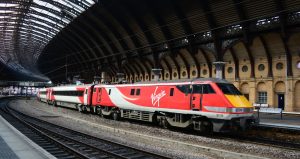• The East Coast Main Line is a key strategic rail route, stretching more than 500 miles, from Inverness and Aberdeen, through key stops at Edinburgh, Newcastle and York to London

Councillors are calling on the UK and Scottish governments to secure funding for Network Rail to improve reliability with significant economic benefits
The Consortium of East Coast Mainline Authorities (ECMA) is calling on the UK and Scottish governments to invest in the East Coast Main Line, after research conducted on behalf of ECMA identified over £60 million of economic benefits per year through punctuality and reliability improvements on the line.
A third of the UK population lives within 20 minutes of an East Coast Main Line station and together they deliver 41% of the UK’s GDP. However, constraints on the line can lead to significant disruption and in 2018, 12 major incidents occurred costing the UK economy £46.28 million. Each major incident equates to a full loss of service per day and this unreliability is one of the contributing factors to the Public Performance Measure* (PPM) of the East Coast Main Line dropping below 80% for the first time in 10 years.
Localised and smaller incidents can also cause significant disruption across the rail network but if the number of delays on the line over 10 minutes were halved, this would deliver an additional £62.8 million per annum to the wider economy.
In June 2018, the Government announced £780 million of investment for the East Coast Main Line in Control Period 6 (2019-2024), which will reduce journey times on key flows and provide new direct links to some cities and towns. However, the majority of this work will be completed by 2021 with no current plans for further improvements or resources to fund them.
ECMA members are calling on the government to identify additional funding to help tackle issues of capacity and resilience on the line, with Network Rail indicating that they have the capacity to undertake further work to improve the East Coast Main Line from 2021, if they can secure additional funding.
Cllr Keith Aspden, Leader of City of York Council and Chair of ECMA, said:
“Investment in the East Coast Main Line will deliver economic benefits across the country from the Highlands to Hertfordshire and means customers benefit from better reliability and greater resilience.
“Currently, the line is vulnerable to major disruptions which is why ECMA is calling on the UK and Scottish governments to secure addition funding for Network Rail to deliver a more reliable rail network for customers.”
Cllr Andy D’Agorne, Deputy Leader of City of York Council and Executive Member for Transport, said:
“York’s rail connectivity is a key asset to the city’s residents and businesses and a world-class transport hub which contributes significantly to our city’s economy. The ability to visit and do business with cities like London or Edinburgh in a day is a substantial benefit to the region which relies on this infrastructure being fit for purpose.
“It is vital that this much needed, sustainable transport network is given the care and investment it deserves to serve the populations up and down the country for years to come.”
In a letter sent to the Department for Transport and Transport Scotland, members of ECMA are calling on the governments to invest in the East Coast Main Line, and in particular:
- Deliver the promised infrastructure improvements to allow the full delivery of the 2021 timetable
- Secure additional funding for Network Rail to invest in East Coast Mail Line reliability improvements
- Ring-fence Network Rail’s future funding for the East Coast Main Line improvements in Control Period 7 (2024-29)

 THE troubled East Coast Mainline rail service is to be renationalised after a franchise agreement with Virgin Trains was scrapped, Transport Secretary Chris Grayling has announced.The service is being brought back into public ownership after a string of failures by Stagecoach and Virgin in recent years.
THE troubled East Coast Mainline rail service is to be renationalised after a franchise agreement with Virgin Trains was scrapped, Transport Secretary Chris Grayling has announced.The service is being brought back into public ownership after a string of failures by Stagecoach and Virgin in recent years.